LGBT+ life at St Andrews

For over 40 years, LGBT groups at St Andrews have aimed to provide an open and safe environment for people to be who they are without fear of discrimination.
For a University with over 600 years of history, 40 years may feel like a short period of time. However, during this timeframe much has changed for the better for LGBT+ students and staff at St Andrews.
From one of the initial groups, GaySoc, to the formation of the current subcommittee Saints LGBT+, social attitudes may have changed, but the purpose of each group has remained the same – to promote equality, diversity and inclusivity and to provide a supportive environment regardless of sexuality or gender.
LGBT history in St Andrews
The Glasgow Women’s Library houses a collection of archive material which spans the past 40 years of LGBT life at St Andrews, including a minute book from the academic year 1977-1978. The first entry made in the notebook is the minutes of a meeting which took place in the TV room of the old Students’ Union on Sunday 9 October 1977. During this meeting, attended by eight people, discussion points included what name the group should adopt, the necessity of having elected officers to obtain grant money, and preparation for upcoming events such as a discussion on ‘being gay in St Andrews’.
LGBT students studying in St Andrews during the 1970’s experienced a very different society compared to today. As social attitudes and laws have changed, LGBT representation at St Andrews has evolved to reflect this change. GaySoc transformed into the LGB Society, acknowledging the broader spectrum of sexuality that exists; then in 2006, the group voted to rename as LGBTSoc, becoming one of the first universities in Scotland to represent transgender people in the Society’s name.
Whilst the Society has evolved, its purpose has remained the same. LGBT groups in St Andrews have always existed to provide a place for students to socialise, offer support to members regardless of their sexuality, promote equality, and raise awareness of LGBT+ issues to a wider audience.
As society has become more accepting of LGBT+ people, increasing numbers of students have felt confident enough to get involved. In the academic year 1997-1998, there were 42 recorded members in the Society and this grew to 182 members by the academic year 2008-2009 – a vast increase from the eight attendees at the initial 1977 meeting. Today, all matriculated students are automatically a member of Saints LGBT+ as the group exists as a subcommittee of the University.
What is going on at 4 Fleming Place?
One topic that dominates the minutes from 1977 and 1978 is the dispute between GaySoc and the St Andrews Citizen. During this time, the local newspaper refused to publish promotional material for the Lesbian Feminists group and GaySoc, primarily objecting to the words ‘lesbian’ and ‘gay’ on the basis it would offend ‘the elderly and mothers with children’. GaySoc publically protested this refusal, which resulted in the then editor of the Citizen defending his decision by asking the question ‘what is going on at 4 Fleming Place?’.
4 Fleming Place was the location of the Women’s Liberation Group who offered GaySoc a place to host meetings after their previous meeting place on South Street closed down. GaySoc and other members of the St Andrews community took exception to the article implying that 4 Fleming Place was being used as a brothel or for other illegal activity. Several readers wrote to the paper condemning the editorial article, including one from Dr Judith M Ekins, the owner of 4 Fleming Place, who said that the ‘meetings and discussions are conducted in a quiet orderly fashion’.
One former member of the group who attended meetings in the 1970s said that 4 Fleming Place was a vital resource for providing a safe place and for raising awareness during a time of significant social change. This former member also confirmed that 4 Fleming Place was only ever used as a meeting place where discussion and debate were encouraged.
Saints LGBT+
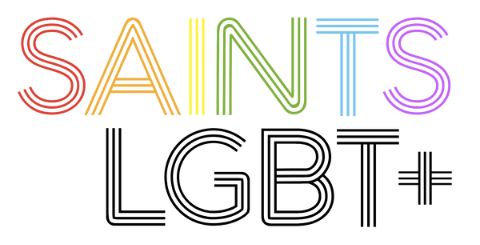 Today’s St Andrews students are represented by Saints LGBT+, which is a subcommittee of the Students’ Association. Subcommittees are central to the work of the Students’ Association, and all students are automatically members from matriculation through to graduation. Saints LGBT+ has at its core a mission to provide for the LGBT+ community in St Andrews and to stand against discrimination in all its forms.
Today’s St Andrews students are represented by Saints LGBT+, which is a subcommittee of the Students’ Association. Subcommittees are central to the work of the Students’ Association, and all students are automatically members from matriculation through to graduation. Saints LGBT+ has at its core a mission to provide for the LGBT+ community in St Andrews and to stand against discrimination in all its forms.
The Saints LGBT+ motto is ‘Libertas, aequlitas, sodalitas‘ (Liberty, equality, fellowship), and the organisation is one of the most active St Andrews student groups, hosting a minimum of one event per week during term-time. Over and above these general events, they run a number of initiatives that focus on the wellbeing of LGBT+ people in St Andrews, from identity-specific coffee meetups and committee office hours to ‘Let’s Talk’ events which allow students to talk about their experiences in a safe and non-judgemental environment.
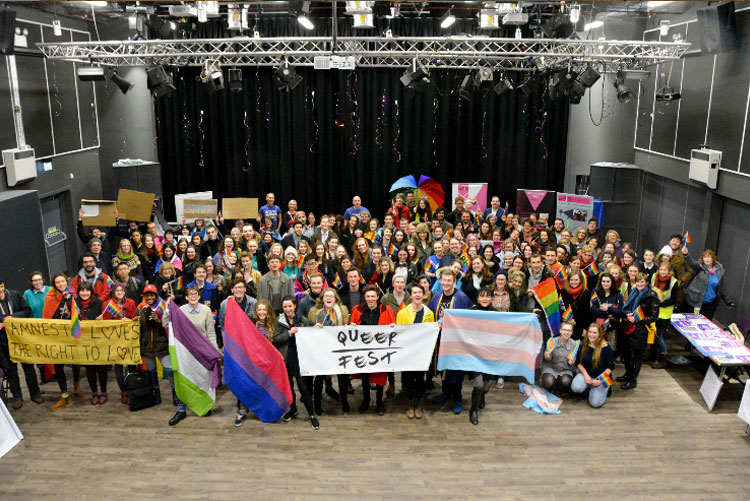
Among the highlights of the Saints LGBT+ calendar are Queer Fest, Trans Fest, Glitterball, and PRIDE.
Queer Fest marks Queer History Month by celebrating LGBT+ contributions to culture and the arts, platforming artists in St Andrews and beyond. Queer Fest events have ranged from a night of new work from Queer St Andrews playwrights to dRAG Walk (a charity drag competition which raises money for the Scottish Transgender Alliance).
Trans Fest is a celebration of gender diversity which creates a space for trans and gender diverse people in the St Andrews community and beyond to celebrate their identities.
Saints LGBT+ have also run an annual Glitterball since 2013, celebrating diversity in a sparkling and joyful manner. The ball has now grown to be one of the most anticipated nights of the year, with approximately 1,000 guests, and is privileged to have a site on University property overlooking the North Sea.
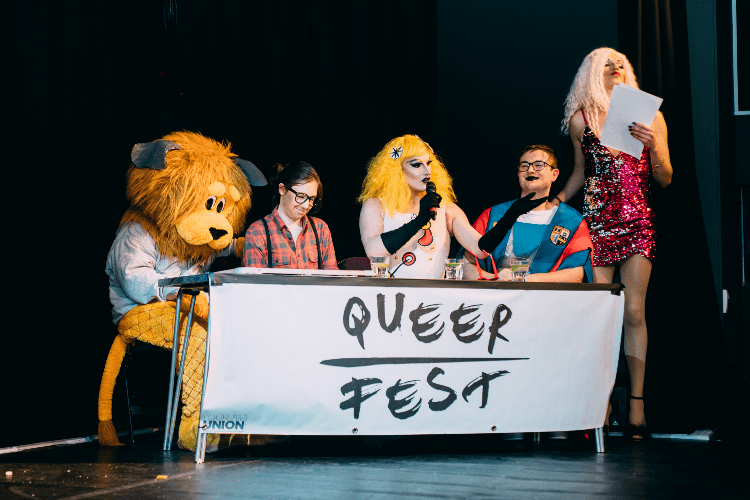
As St Andrews has no dedicated LGBT+ spaces, Saints LGBT+ take it upon themselves to create those spaces within the community, running events including a Queer Question Time debate and at a club night hosted to round off Sexual Health Awareness Week. Saints LGBT+ exists as a subcommittee to ensure that LGBT+ people are supported and are able to express themselves authentically in St Andrews.
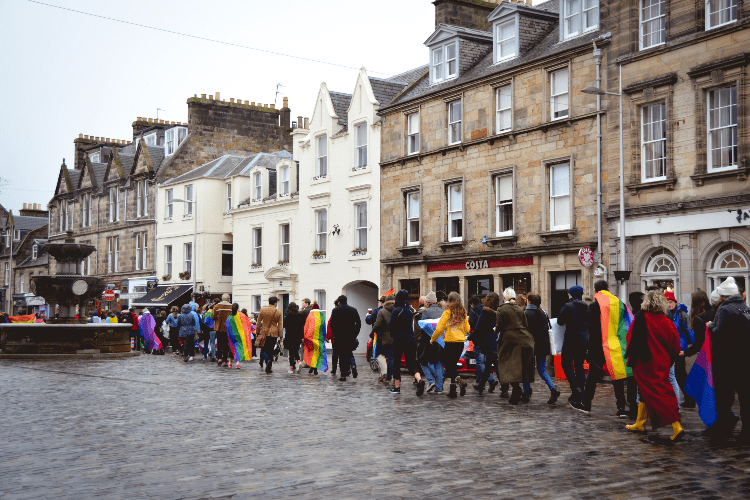
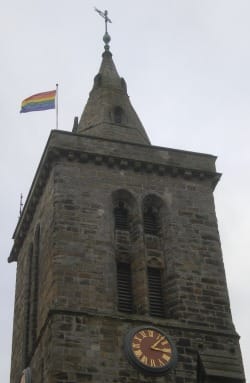 The best example of this is St Andrews PRIDE, which is Fife’s longest-running LGBT+ Pride event. St Andrews PRIDE brings together the whole St Andrews community, inviting students, residents, schools, businesses and charities to march through town sending a clear message that LGBT+ people are supported and welcomed in this environment. The event has grown year on year, and seeing the rainbow flag on St Salvator’s Chapel makes a clear statement about equality and diversity in St Andrews.
The best example of this is St Andrews PRIDE, which is Fife’s longest-running LGBT+ Pride event. St Andrews PRIDE brings together the whole St Andrews community, inviting students, residents, schools, businesses and charities to march through town sending a clear message that LGBT+ people are supported and welcomed in this environment. The event has grown year on year, and seeing the rainbow flag on St Salvator’s Chapel makes a clear statement about equality and diversity in St Andrews.
Students’ Association support
The Students’ Association is the hub of all student activity in St Andrews. Open to all students, the Association provides events, student representation and extracurricular activities to make the student experience the best it can be. The Equal Opportunities Committee, headed by the Association’s Director of Wellbeing, focuses on issues including equality and Saints LGBT+, and in September 2013 the Students’ Representative Council adopted a zero-tolerance policy which protects members from any form of harassment.
Below, Lewis Wood, Students’ Association President 2017-2018, explains how the Association builds inclusivity into everything it does as well as the initiatives it has introduced to promote diversity and inclusivity including the introduction of gender-neutral toilets on all floors of the Union building.
Representation across the University
While Saints LGBT+ and the Students’ Association support students throughout their time at St Andrews, the University is also committed to supporting all members of the St Andrews community – including staff members.
The University of St Andrews is committed to eliminating discrimination and promoting equality across the University while supporting equal opportunities for all staff regardless of their age, gender, sexual orientation or any other protected characteristic listed in the Single Equality Act.
In May 2015, the University became the fourth Scottish university to gain the Stonewall Diversity Champions award which commits the University to working with Stonewall, Europe’s largest LGBT charity, to improve the working lives of lesbian, gay, bisexual and transgender staff.
One staff member and former student says that they have witnessed a changing ethos at the University since joining in the early 2000s. Initially wary about coming out to colleagues, they are now comfortable and open thanks to new protections in law and social attitude changes. Having Ruth Hunt, Chief Executive of Stonewall, provide the congratulatory address at the Principal Sally Mapstone’s installation was, for many, a confirmation of progress.
As part of promoting equality and diversity within the University, the LGBTIQ+ staff network (lesbian, gay, bisexual, transgender, intersex and queer) exists to provide a supportive, open environment for LGBTIQ+ staff and allows for members to give feedback on LGBTIQ+ impacting policy and initiatives. The University also has a list of LGBTIQ+ staff role models who share their experiences of being LGBTIQ+ at St Andrews. The LGBTIQ+ network is open to any staff member who wishes to join.
LGBT+ after St Andrews
For every year that Saints LGBT+ welcomes a new cohort of students, they also have to say goodbye to those graduating and moving on. Whether they have been involved for one semester or four years, members form lifelong friendships and romantic relationships. However, once they have departed St Andrews, the network of support does not come to an end.
The University of St Andrews LGBT Alumni Association has been running since 2009 and welcomes past students, whether they were members of GaySoc, LGBTSoc, Saints LGBT+ or not. The group continues the sense of community provided by the different LGBT groups and allows for new friendships to be made between the different generations of students.
The alumni association also holds events ranging from Pride meetups in Edinburgh and London to family-friendly summer picnics which allows for alumni to reminisce, share stories and learn about LGBT in St Andrews through the years.
Students look back on their time with LGBT groups in St Andrews fondly, as for many it was the first time they got to experience a sense of belonging. For some, the groups helped them to come out and feel comfortable with who they are. Former members have praised the group for providing a community for discussion, debate and fun.
It wasn’t a place where people were ‘ok’ to be gay, it was a place where this was fabulous and proudly celebrated.
Jennifer Irvine-Cadman, president of LGBTSoc between 2008 and 2009, says so much has changed since her time at university. While there are still many inequalities to be fought, society is a more tolerant place than it was ten years ago. During Jennifer’s time in LGBTSoc, some members joined towards the end of their degree as many were still not confident to talk about being LGBT. The Society, however, was an exciting, fun and vibrant place where everyone was accepted for who they were. Many of Jennifer’s friends from her time at St Andrews come from LGBTSoc, and it was also here where she met her now wife, Beth, who herself was president of LGBTSoc between 2006 and 2007.
Fiona Stirling, Social Anthropology graduate, first joined LGBTSoc in 2006. Fiona remembers that membership was not just about joining another society, it was making a declaration to yourself and to others about who you were. Whilst this could be terrifying and exhilarating, there was always full support from the group. Fiona says that the transition from Society to subcommittee was significant as it reflected and supported the changes which were happening in wider society.
I have gone on to study further at other universities and never found an LGBT the same as the one at St Andrews. They have never had the same sense of community. They have never felt like home.
The future of LGBT+ at St Andrews
The University continues to work hard to build an inclusive community. In December 2017 the University became the first Scottish university to be presented with the LGBT Youth Scotland LGBT Charter award in recognition of work improving and evidencing LGBT inclusion.
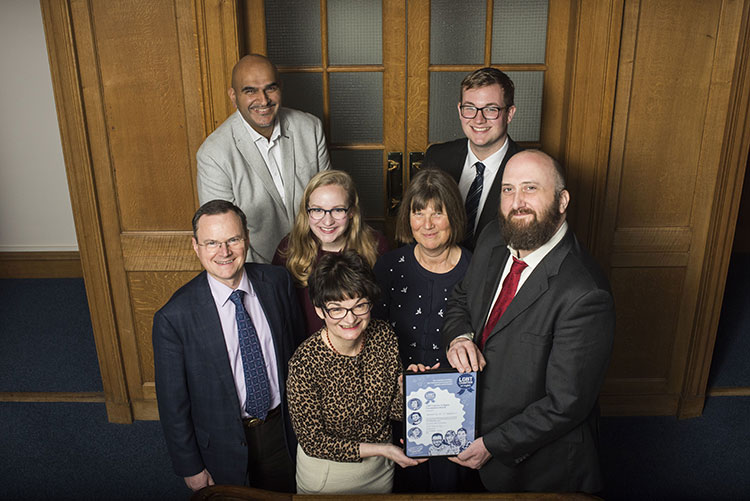
While the University has endeavoured to make St Andrews a place open to all, eliminate inequalities and promote diversity, there is always the opportunity to progress further.
Watch Lewis Wood share his thoughts on what future initiatives he would like to see implemented to continue to build upon existing work.
Advice and support
If you’re interested in further information and advice about LGBT+ issues, take a look at the following groups and services:
- The ASC (The Advice and Support Centre) is the front door to the University for all students. Based at 79 North Street, students can call in with any query for friendly, effective, efficient and confidential advice.
- Nightline St Andrews is a student-run confidential, anonymous listening and information service. Students can speak to confidential volunteers in a non-directive, judgment-free environment.
- Saints LGBT+. You can get in touch with Saints LGBT+ directly where their friendly members will be happy to welcome you to upcoming events or offer advice.
- Stonewall Scotland has a wealth of information for the LGBT community and their allies on their help and advice webpages.
Credits
Graphics and design by the University of St Andrews digital communications team. Content written by John Chapman, digital communications team, with contributions from Ryan Hay.
Images by Emily Montay and Mariah Dennis from Lightbox Creative. Video and editing by Lewis Wake, digital communications team.
Thanks
Saints LGBT+ for their support and time on this project.
Lewis Wood and the Students' Association for their contributions.
Glasgow Women's Library for access to archive materials.
Jennifer Irvine-Cadman and members of the University of St Andrews LGBT Alumni Association for their contributions.
Contact
Email: [email protected]
Phone: +44 (0)1334 46 2108